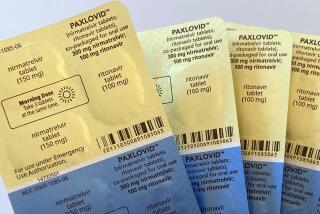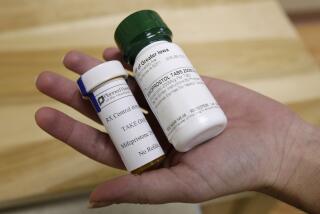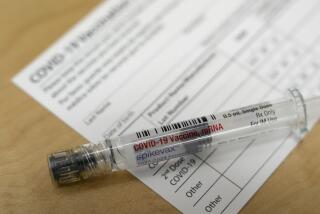Fear Boosts Antibiotics Sales
- Share via
Fear of being infected with anthrax bacteria has triggered a run on the powerful antibiotic Cipro at some pharmacies and doctors’ offices nationwide.
One Southern California family demanded 60-day supplies of Cipro for its six children, at an estimated cost of more than $3,500. Several local doctors also have requested the drug to keep not just in their offices but also in their homes.
“They’re really panicking,” Dr. Paul Geller, a Beverly Hills internist, said of some patients. “No matter how we try to be logical with them, they still go back to their own insanity.”
Officials at Bayer AG, which makes Cipro, acknowledged the tremendous attention their drug has received in recent days as Florida officials investigate three cases of anthrax exposure, one of them fatal.
“Given all of the information and all of the play that’s been out in the media, I would not be surprised to see an increase in demand,” said Karen Dawes, senior vice president for sales and marketing.
Fears have also been fueled by false alarms, including a suspicious package received Wednesday by a soldier at Ft. Irwin near Barstow. A California National Guard bioterrorism unit flew to the scene, and the package turned out to be a chain letter filled with corn starch.
The public demand for protection is so high that Bayer is opening a shuttered plant in Germany to increase production of Cipro raw materials by 25%. Cipro is the only drug approved by the U.S. Food and Drug Administration to treat inhalational anthrax after exposure. Studies have shown that other drugs, such as doxycycline and penicillin, also work, but they are not FDA-approved for anthrax.
Antibiotics have been shown to improve a patient’s prognosis if taken after exposure to anthrax--but before symptoms appear. A delay of several hours may substantially lessen chances of survival.
Consumers who are stockpiling the drug are paying hefty sums (more than $5 per pill) and ignoring warnings from public health officials about the danger of indiscriminate use of antibiotics. The pill costs so much because it has no generic alternative.
“They’re going crazy,” said Dr. Laurene Mascola, chief of acute communicable disease control for the Los Angeles County Department of Health Services.
Mascola said her own pharmacy in La Canada was out of the doxycycline used to treat her son’s acne.
Geller said patients have told him that it is cheaper to keep a supply of Cipro in their medicine cabinets than to see a psychiatrist to deal with fears of contracting anthrax.
If pushed, Geller said he prescribes small amounts of Cipro to patients to give them peace of mind. And for two patients who demanded 60-day supplies each, he prescribed a total of 360 pills.
“That’s a lot of pills and a lot of money,” he said. “I would discourage it completely.”
One drug wholesaler in California told Los Angeles County health officials of rapidly increasing sales. In August, the company sold 445 bottles of Cipro, each containing 100 of the 500-milligram pills. That jumped to 835 bottles in September and 600 in the first 10 days of October, Mascola said.
AdvancePCS, the largest U.S. manager of pharmacy benefits, said the number of weekly prescriptions for Cipro climbed to 30,000 last week from an average of 28,000. But sales in New York City have doubled since Sept. 11. And in Boca Raton, where a man died of anthrax last week, sales are up by a third, AdvancePCS spokesman Blair Jackson said.
Demand has peaked in the last three days, pharmacies said, as the Florida cases became known.
Locally, pharmacies have seen different levels of demand, with increases more common in affluent areas.
At the Horton and Converse Pharmacy on Wilshire Boulevard in Los Angeles, daily sales of Cipro have doubled. Pharmacist Calvin Lai said he warns patients about the side effects of Cipro and that improper use of the drug can cause resistance in the future. The drugs being dispensed now expire in May 2004.
“They take it with a grain of salt,” Lai said. “For most people, they’re not taking the drug. They’re just keeping it on hand.”
This attitude leads to a misplaced sense of security, Mascola said.
“What if it’s not anthrax? What if it’s something else?” she asked. “Are we going to get every prescription known to man in our back pocket? We need to save what we have for the real incidents.”
*
Times staff writer Phil Willon contributed to this report.
More to Read
Inside the business of entertainment
The Wide Shot brings you news, analysis and insights on everything from streaming wars to production — and what it all means for the future.
You may occasionally receive promotional content from the Los Angeles Times.










